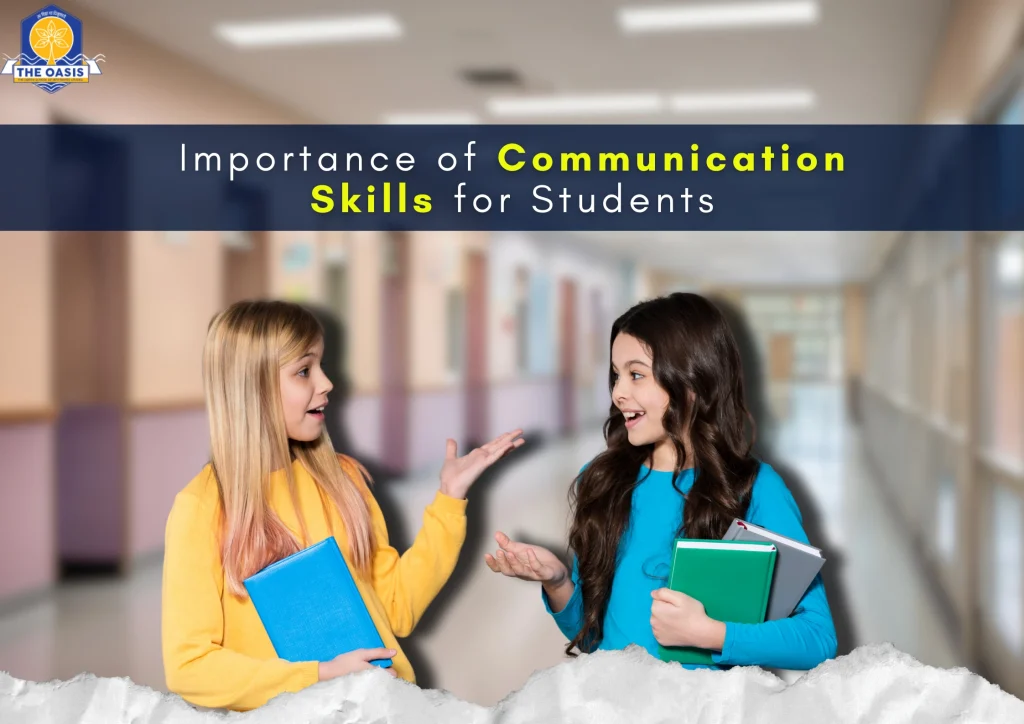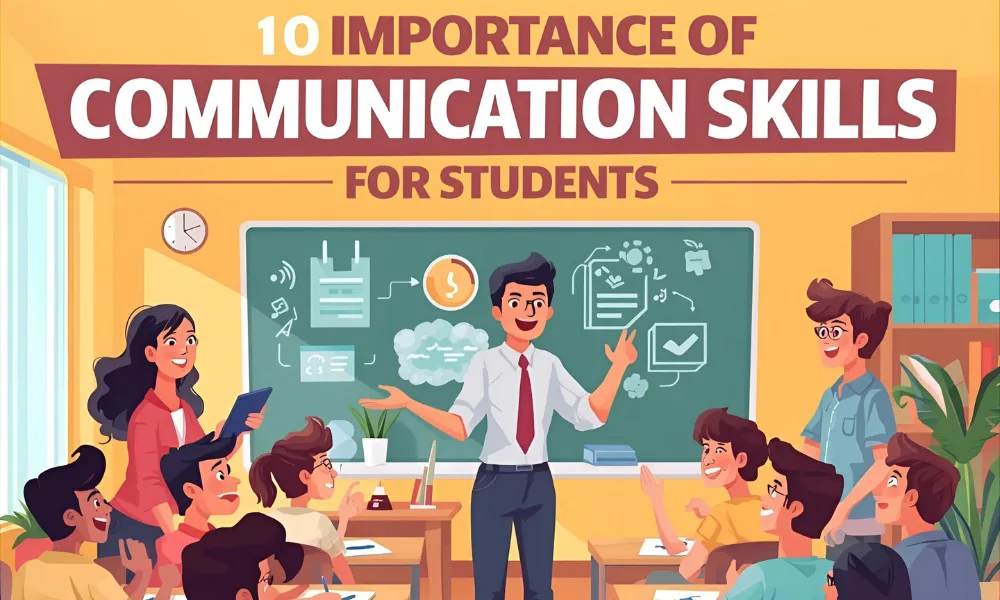
In school, students learn far more than formulas and facts. They know how to express themselves, listen to others, and share ideas clearly. That is the true power of communication. The Importance of Communication Skills for Students extends beyond textbooks, it shapes confidence, fosters strong friendships, and prepares them for life after school. A student with strong communication skills doesn’t just score well in exams but also thrives in group projects, debates, interviews, and even everyday conversations.
- What Are Communication Skills?
- Why Are Communication Skills Crucial in School?
- 10 Importance of Communication Skills for Students:
- 1. Builds Confidence
- 2. Improves Academic Performance
- 3. Enhances Listening and Understanding
- 4. Strengthens Teamwork in Projects
- 5. Develops Leadership Qualities
- 6. Helps in Conflict Resolution
- 7. Encourages Active Participation
- 8. Boosts Creativity and Expression
- 9. Prepares for Future Careers
- 10. Improves Relationships with Teachers and Peers
- Challenges Students Face in Communication:
- Practical Ways to Improve Communication Skills at School:
- Why This Guide Is Better Than Others?
- Communication as a Lifelong Skill:
- Frequently Asked Questions (FAQs)
What Are Communication Skills?

Communication skills are not limited to speaking. They include listening, reading, writing, and non-verbal expression like body language and tone of voice.
In schools, these skills help students:
- Answer questions confidently in class
- Work effectively in groups
- Build meaningful relationships with peers and teachers
- Adapt to digital communication tools like email and online classes
When students understand the importance of communication skills for students, they see how these abilities support their academic journey and personal growth.
Why Are Communication Skills Crucial in School?
Schools are not only about grades; they are about preparing students for real life. Good communication allows students to:
- Express their thoughts clearly
- Ask the right questions when in doubt
- Share ideas in discussions or debates
- Understand instructions better
- Collaborate with classmates
This makes communication one of the most essential skills to learn early.
10 Importance of Communication Skills for Students:

Here are ten reasons why communication matters so much in a student’s life:
1. Builds Confidence
Students who communicate well feel confident to speak up in class, participate in discussions, and present their ideas without hesitation. Confidence built at school helps in interviews, competitions, and later in professional life.
2. Improves Academic Performance
The importance of communication skills for students is also seen in academics. Students who can ask questions, clarify doubts, and discuss topics with teachers often perform better because they understand lessons clearly.
3. Enhances Listening and Understanding
Communication is not just about talking. Active listening allows students to grasp classroom instructions, understand assignments, and engage meaningfully with peers. Good listeners also develop empathy and patience.
4. Strengthens Teamwork in Projects
Group projects are a big part of school life. Communication skills help students share responsibilities, resolve disagreements, and achieve results as a team. This teamwork prepares them for future workplace environments.
5. Develops Leadership Qualities
Every leader must be a good communicator. In schools, students who express themselves well often take leadership roles in class, sports teams, or cultural activities. Communication builds trust and motivates others to follow.
6. Helps in Conflict Resolution
Disagreements are normal among students. But with the right communication skills, they can talk through problems, respect other opinions, and solve conflicts peacefully. This reduces stress and improves relationships.
7. Encourages Active Participation
The importance of communication skills for students is also visible in how it encourages participation. A student who communicates well is more likely to join debates, cultural programs, or leadership councils, enriching their school experience.
8. Boosts Creativity and Expression
When students know how to express ideas clearly, they become more creative. Whether it is writing essays, performing in drama, or presenting science projects, communication skills help them showcase creativity.
9. Prepares for Future Careers
Employers value communication more than technical knowledge alone. Students who learn communication early are better prepared for interviews, group discussions, and future career challenges.
10. Improves Relationships with Teachers and Peers
Good communication builds trust. Students who talk openly with teachers and peers create strong bonds. These relationships create a positive environment for learning and emotional growth.
Challenges Students Face in Communication:
Even though the importance of communication skills for students is clear, many face obstacles such as:
- Shyness or fear of public speaking
- Language barriers in multi-lingual classrooms
- Over-reliance on digital communication instead of face-to-face interaction
- Lack of practice opportunities in classrooms focused only on academics
Acknowledging these challenges helps schools and parents guide students better.
Practical Ways to Improve Communication Skills at School:
Students can build communication skills with consistent practice. Some simple methods are:
- Participate in group discussions and debates to practice public speaking
- Read books, newspapers, or stories to improve vocabulary
- Listen actively in class and note down key points
- Use digital communication wisely by practising email and online class etiquette
- Join drama, quiz, or public speaking clubs to gain confidence
- Seek feedback from teachers to improve clarity in expression
These steps help transform communication from a weakness into a lifelong strength.
Why This Guide Is Better Than Others?
While many articles talk about communication, this guide stands out because:
- It combines academic, personal, and career benefits in one place
- It includes practical improvement tips instead of just theory
- It acknowledges challenges and provides real solutions
- It uses simple, humanized language so students and parents can connect easily
Most importantly, it integrates digital-age communication, which many articles miss. This makes the guide more relevant to today’s students.
Communication as a Lifelong Skill:
The importance of communication skills for students is undeniable. From building confidence and academic success to preparing for future careers, communication shapes every part of a student’s journey. Schools can provide knowledge, but communication helps students share that knowledge with the world. By improving their speaking, listening, and expression, students prepare themselves not just for exams but for life.
Frequently Asked Questions (FAQs)
Ques 1. What is the importance of communication skills for students?
Ans. Communication skills help students express ideas clearly, build confidence, improve academic performance, and prepare for future careers.
Ques 2. Why are communication skills important in school life?
Ans. They allow students to interact better with teachers and peers, participate actively in class, and work effectively in group activities.
Ques 3. How do communication skills affect learning?
Ans. Good communication enables students to understand lessons better, ask questions, clarify doubts, and retain knowledge more effectively.
Ques 4. What is meant by student communication skills?
Ans. These are the abilities of students to listen, speak, read, and write effectively, both in and outside the classroom.
Ques 5. How do teachers benefit from students with good communication skills?
Ans. Teachers find it easier to guide students who communicate well because they can express their needs and doubts clearly.



